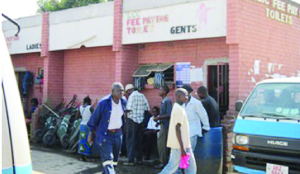By JOWIT SALUSEKI –
Over the years, Lusaka has continued to grow and this is evidenced by the increase in population and the infrastructure that is coming up across the city.

• SEVERAL shopping complexes in Lusaka have increased fees for public toilets to prevent drivers at Kulima Tower from using their facilities.
The increase in population has brought with it numerous challenges and one area that has not been spared is that of public conveniences. One has to visit the Central Business District (CBD) to realise how acute this problem is.
The lack of adequate public conveniences has driven some vendors to come up with alternative ‘toilets’ while those who don’t want to part away with their few coins, answer the call of nature in some of the most weird ways.
Some vendors even urinate next to privately owned vehicles parked in slots while others use empty bottles to relieve themselves and then throw the bottles underneath parked cars.
With the rain season only a few months away, water-borne diseases such as cholera and other diarrhoeal infections will soon become the order of the day if this situation is not corrected.
Apart from the two recently built Lusaka City Council (LCC) public toilets which are located behind the Main Post office and Findeco House, there are only a handful of fee paying toilets within the town centre at designated places such as the Westgate Mall located on Freedom Way and the Millennium Bus Station.
There are also a few fee paying toilets at Southgate shopping complex, nonetheless, there are not enough to cater for the swarm of people who carry out their business within town centre therefore some people even walk distances to as far as Levy Business Centre in order to answer the call of nature.
The LCC owned toilets charge K1 while those at the privately owned Westgate mall and other designated areas require you to part with a fee of K2.
In view of the scarcity in public conveniences, the LCC says the private sector should come on board and partner with it in order to build more lavatories within the town centre.
The LCC public relations manager Mulunda Habeenzu said the local authority is eager to partner with other stakeholders who are ready to offer land where public toilets can be built as a way of mitigating the situation.
According Mercy Mvula, an attendant at Lusaka’s Westgate mall on a good day the shopping centre makes up to K200 in revenue from its fee paying toilets.
However, due to the scarcity in fee paying toilets, some trees and every space available have become ‘urinals’, an option especially for hundreds of male street vendors who would not want to spend any single coin on fee-paying lavatories from their daily earnings, while others urinate in empty packets of opaque beer.
Roads with high traffic in terms of business such Cairo Road; the once upon-a-time cleanest road in town and others such as Freedom way and Lumumba Road are the worst hit.
To be precise, trees standing opposite Ambia House on Cairo Road are regularly used as ‘urinals’ to an extent that the grass nearby is getting ‘burnt’.
The sight is pathetic to say the least! Some men are sometimes seen urinating on the vegetation planted on islands of Cairo Road during the day and they don’t seem bothered at all.
The incomplete Kalenga Mususu building which is on the junction of Katondo and Freedom Way is another option which the vendors utilise especially traders who conduct their business near Stanley Bar.
Those who have found trading space close to this place have confessed that they are slowly moving metres away because even they too cannot bear the stench.
At Lusaka’s Munyaule Market which is an illegal trading centre right in the heart of the city, the traders there make use of empty packets of opaque beer commonly known as ‘flying toilets’ to answer the call of nature.
Amos Mwanza, who owns a restaurant at the infamous market, says there is only a single toilet which is in a deplorable state at the trading area.
“The toilet is mostly used by men to urinate while women normally go to the nearby Westgate Mall where they pay K2 to use the facilities there”, explains Mr Mwanza.
Mr Mwanza noted that because of inadequate toilets at Munyaule market, some traders and the clients who patronise the illegal sheebens which sell alcoholic beverages normally use empty packets of Shake Shake beer to answer the call of nature.
The empty packets are then thrown in the drainage system thereby blocking the furrows.
Maybe this is where the Zambia Environmental Management Agency (ZEMA) should also be strict and come up with stringent measures like banning the use of non-decomposing packages so as to deter the public from polluting the environment just like what Rwanda did a few years ago.
In 2008, the small East African nation of over 12 million people instituted a national ban on non-biodegradable plastic bags. The polyethylene bags, which shoppers typically only use once before throwing out, are known to amass in landfills, litter streets, obstruct sewer systems and hurt human and marine life.
Owners of businesses that violate the ban face up to a year in prison, and anyone caught carrying a bag faces a stiff fine. Businesses that flout the rules are raided; travellers who enter Rwanda’s borders are subject to searches.
The onus is for the members of the public to change their mindset and refrain from answering the call of nature anyhow while the council should also urgently build more public toilets to meet the high demand exacerbated by the increase in the number of people trading within the town centre.






